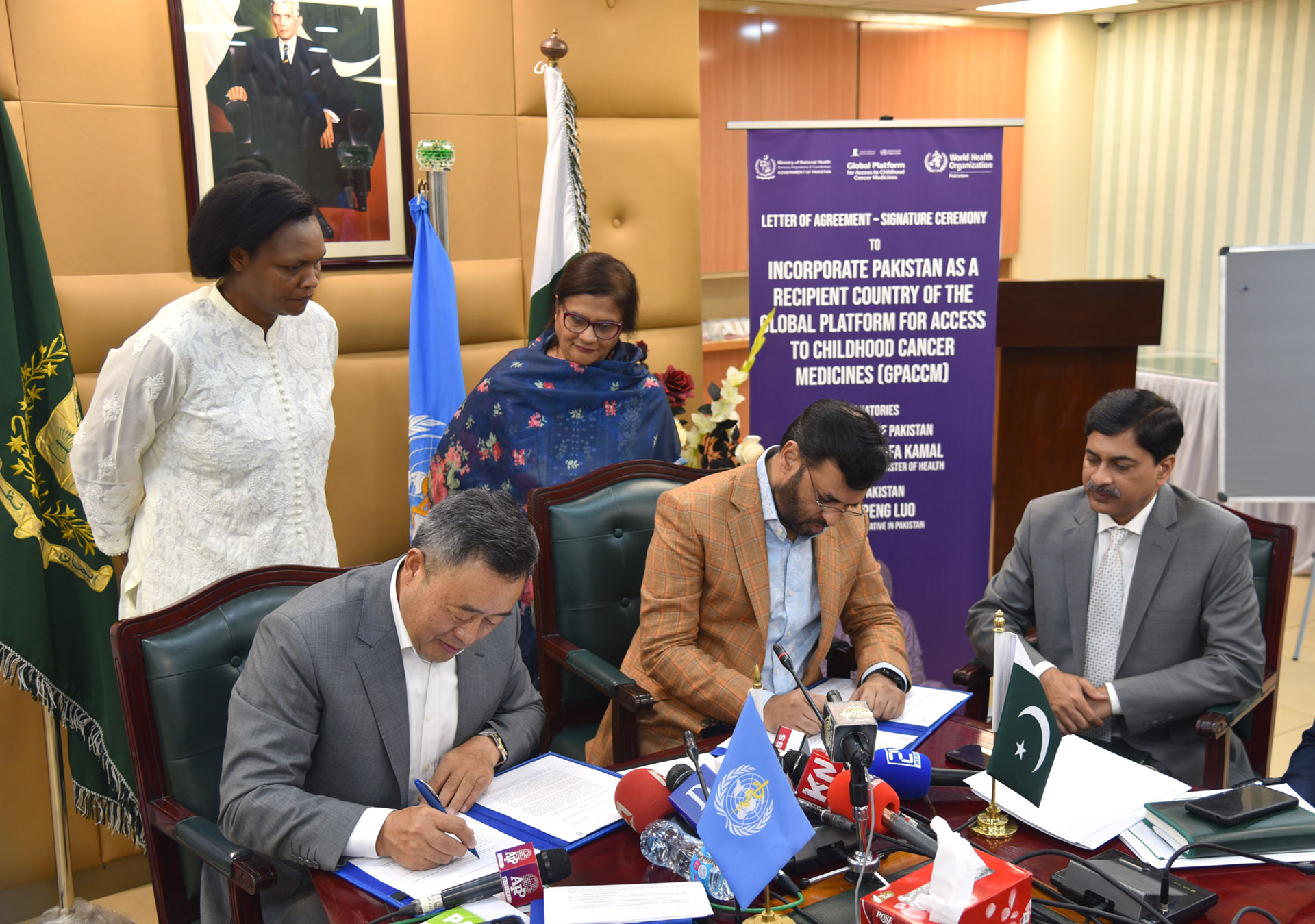Pakistan becomes the second country in the region to join the Global Platform for Access to Childhood Cancer Medicines, aiming to address the lack of treatment affecting at least 50% of pediatric patients and to increase their survival rate from 30% to 60% by 2030.
29, July 2025, Islamabad, Pakistan – The World Health Organization (WHO) and the Ministry of Health formalized today Pakistan’s participation in the Global Platform for Access to Childhood Cancer Medicines (Global Platform) to provide quality-assured medicines – free of cost – to children affected by cancer in the country, where over 8000 new cases are diagnosed annually.
The agreement brings new hope to children suffering from the disease in Pakistan and aims to increase their survival rate from 30% to 60% by 2030. Limited access to treatment is one of the main factors behind the low survival rate in the country, compared to a survival rate of 80% in higher-income countries.
Pakistan is the second country in the Eastern Mediterranean Region to join the Global Platform, co-founded in 2021 by St. Jude Children’s Research Hospital and WHO to provide an uninterrupted supply of certified cancer medicines to low- and middle-income countries (LMICs). The initiative works in collaboration with the United Nations Children’s Fund (UNICEF), that will be responsible for procuring medicines and delivering them to Pakistan.
In addition to the provision of medicines, WHO will continue to support Pakistan’s Ministry of Health and provincial authorities with technical guidance, resources, and operational support to fight childhood cancer.
The agreement, signed by Federal Health Minister Syed Mustafa Kamal and WHO Representative in Pakistan Dr Dapeng Luo, will remain in force until 31 December 2027 and may be extended by written agreement of the parties.
“Today is a big day for Pakistan, because through this agreement we are going to receive medicines to treat children who have cancer. This is the way forward. We are thankful to WHO, the Global Platform, UNICEF, and all partners who have made this possible and give our children access to treatment to fight this disease. If we are able to save one life through this collaboration, we are saving mankind,” said Federal Health Minister Sayed Mustafa Kamal.
“No child affected by cancer should die because of lack of access to treatment, including quality-assured medicines. WHO will work side by side with the Ministry of Health and partners to save lives and leave no child behind, no matter where they live or who they are,” said WHO Representative in Pakistan Dr Dapeng Luo.
It is estimated that 400 000 children develop cancer each year. Close to 90% of them live in LMICs, where survival rates are less than 30%, meaning 7 out of 10 children affected by cancer do not survive.
About WHO
Founded in 1948, WHO is the United Nations agency that connects nations, partners, and people to promote health, keep the world safe and serve the vulnerable. We work with 194 Member States in 150+ locations – so everyone, everywhere, can attain the highest level of health. WHO has been present in Pakistan – founding member of the Organization – since 1960. For more information, visit https://www.emro.who.int/countries/pak/index.html. Follow WHO Pakistan on Twitter and Facebook.
About the Global Platform
The Global Platform for Access to Childhood Cancer Medicines was launched in 2021 by St. Jude Children’s Research Hospital and WHO, which jointly developed the initiative to complement the Global Initiative for Childhood Cancer, with UNICEF and the Pan American Health Organization Strategic Fund serving as the procurement agents. The Global Platform aims to provide an uninterrupted supply of quality-assured cancer medicines to approximately 120 000 children in low- and middle-income countries in the next five years, with the expectation of scaling up supplies in future years. The Global Platform provides end-to-end support in consolidating global demand to shape the market and assists countries with the selection of medicines, development of treatment standards and the building of information systems to track that effective care is being provided.
For additional information, please contact:
Maryam Yunus, National Professional Officer – Communications, WHO Pakistan,
This e-mail address is being protected from spambots. You need JavaScript enabled to view it
(copying
This e-mail address is being protected from spambots. You need JavaScript enabled to view it
)
José Ignacio Martín Galán, Head of Communications, WHO Pakistan,
This e-mail address is being protected from spambots. You need JavaScript enabled to view it
